
by Debi Blaney, NOAA Office of Ocean Exploration and Research
NOAA Ship Okeanos Explorer NOAA Corps Officers
November 12, 2018
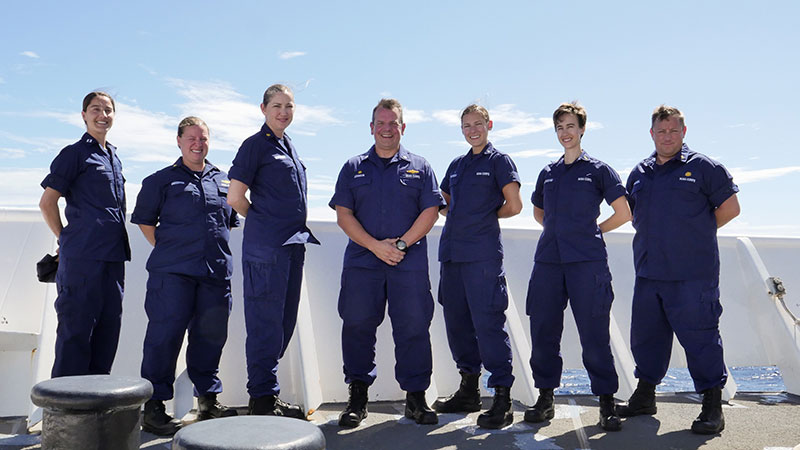
Image courtesy of the NOAA Office of Ocean Exploration and Research, Exploring Deep-sea Habitats off Puerto Rico and the U.S. Virgin Islands. Download larger version (jpg, 2.5 MB).
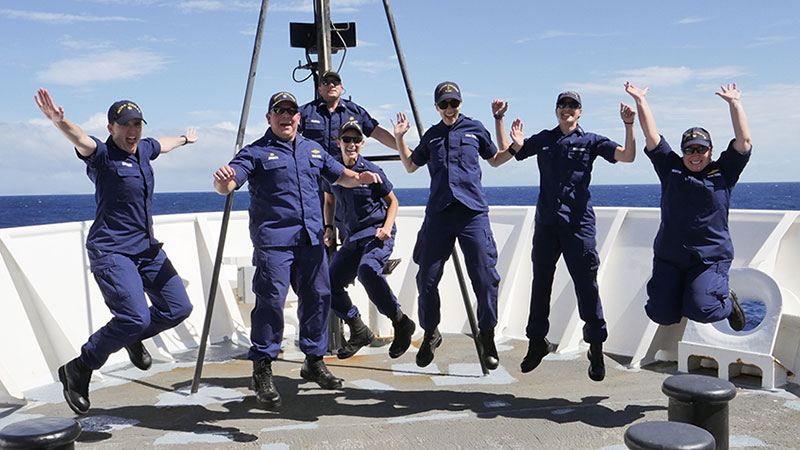
Image courtesy of the NOAA Office of Ocean Exploration and Research, Exploring Deep-sea Habitats off Puerto Rico and the U.S. Virgin Islands. Download larger version (jpg, 2.8 MB).
NOAA Ship Okeanos Explorer is run by a highly trained and dedicated team of NOAA Corps officers. Exploring the deep sea is a complex undertaking that would not be possible without their skills and commitment to keeping everyone on board safe, while efficiently navigating the ship through high and low waters.
Many people are not aware that the NOAA Corps is one of the nation’s seven Active Duty Uniformed Services and that it provides a cadre of professional opportunities in engineering, Earth sciences, oceanography, meteorology, fisheries science, and other science-related disciplines. NOAA Corps officers operate ships, fly aircraft, conduct diving operations, work on research projects, and staff positions throughout NOAA.
To learn more about NOAA Corps and the opportunities it provides, read the career stories presented below of the officers serving on board NOAA Ship Okeanos Explorer. They highlight the personal path of each member of this exceptional, kind, and hard-working team that makes our deep-sea exploration mission possible during the 2018 Océano Profundo expedition.
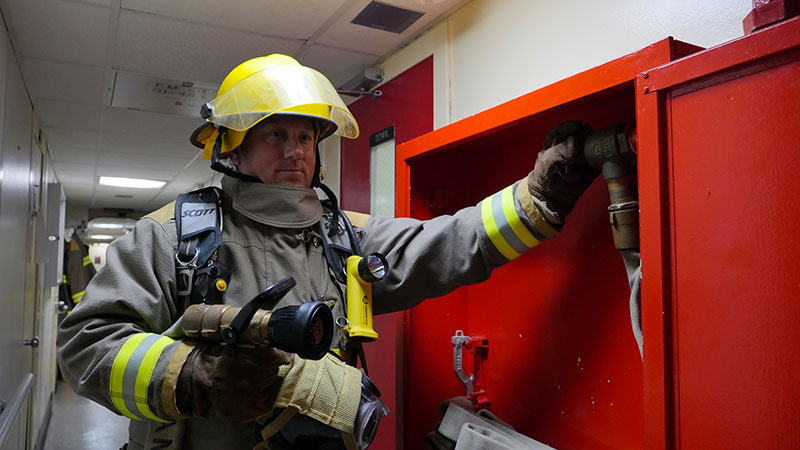
Image courtesy of the NOAA Office of Ocean Exploration and Research, Exploring Deep-sea Habitats off Puerto Rico and the U.S. Virgin Islands. Download image (jpg, 5.8 MB).
I am the Dive Officer and Environmental Compliance Officer aboard NOAA Ship Okeanos Explorer and I perform a whole host of tasks that support the crew and scientists.
Read Brian's Story
I am the Dive Officer and Environmental Compliance Officer aboard NOAA Ship Okeanos Explorer and I perform a whole host of tasks that support the crew and scientists. Eight hours a day, I stand watch and drive a 2000-ton, cutting-edge research ship to remote locations, sometimes covering hundreds of miles a day and other times moving the ship only a few feet at a time so the remotely operated vehicle (ROV) can discover unknown species that are thousands of feet below the ocean's tranquil surface. I serve onboard one of the most awesome ships on the planet. Every day I support missions to the bottom of the sea, to observe what no human has ever seen. We truly are the NASA of the oceans.
People often ask me how I discovered NOAA because they hear amazing stories about what we do. This question is slightly amusing to me because I cannot remember a time when I first learned about NOAA. Growing up, I followed NOAA as they flew into hurricanes and told me when to worry about the weather. Working as a professional mariner, I relied on NOAA to produce the charts I needed to safely navigate ships. As I studied marine biology in college, I was often asked, "Oh, you want to be a Marine Biologist?" The answer was always, "No, not really. I just love the ocean!"
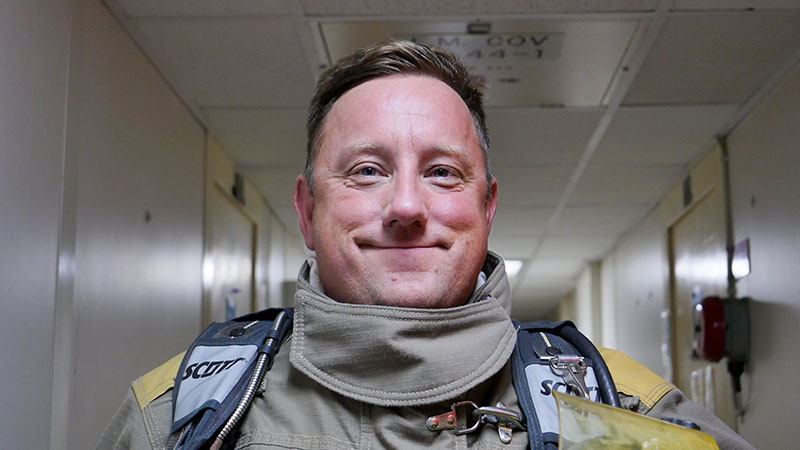
Image courtesy of the NOAA Office of Ocean Exploration and Research, Exploring Deep-sea Habitats off Puerto Rico and the U.S. Virgin Islands. Download image (jpg, 2.9 MB).
From an early age, I knew that I wanted to work on or below the ocean's surface. I spent years trying to become a professional diver, only to learn that I preferred to earn a living driving ships and saving the underwater exploration for my free time. Now I do both. Although I knew that NOAA studied and protected the oceans, I did not fully comprehend the extent of its impact. Even while serving in the U.S. Army after 9/11, I was not completely aware of the NOAA Corps and their service to our country. To this day, I spend plenty of time teaching others that the NOAA Corps is a uniformed service, commissioned by Congress with the same mandate that the military has: to uphold and defend the constitution of the United States. Looking back, working for NOAA was the job my whole career had been geared towards and without knowing it, I was preparing myself to come serve the country in this capacity.
I first came to NOAA as a wage mariner after serving in the Army for 10 years. I was happy to be a civilian after a decade of fighting wars, and I was particularly happy to get up each day and not have to shave! However, once I worked for NOAA as a civilian and fully understood the critical role NOAA plays for our country, it was a simple choice to join the NOAA Corps and once again don a uniform to serve the people of the United States and consequently the greater good for science and the Earth. Yes, I have to shave everyday...but it is a small price to pay!
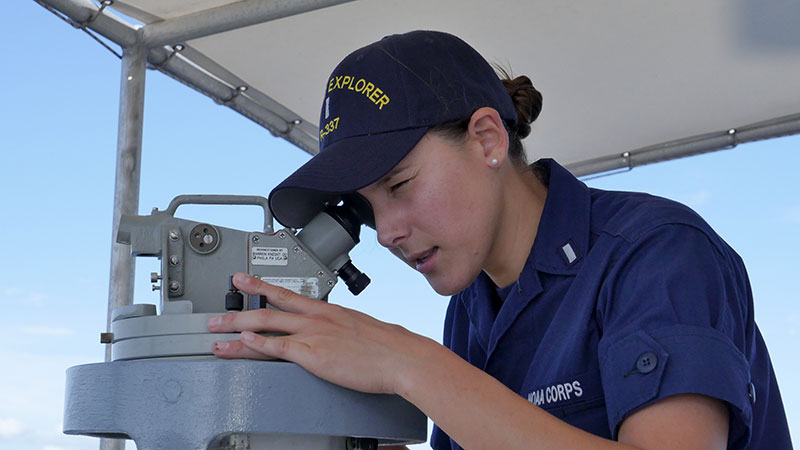
Image courtesy of the NOAA Office of Ocean Exploration and Research, Exploring Deep-sea Habitats off Puerto Rico and the U.S. Virgin Islands. Download image (jpg, 2.5 MB).
I first heard about NOAA Corps while I was serving in the United States Coast Guard. After serving on my first ship, I decided pretty quickly that an adventurous life at sea is the right career fit for me! NOAA Corps combines my love for the sea, science, and service.
Read Brianna's Story
I first heard about NOAA Corps while I was serving in the United States Coast Guard. After serving on my first ship, I decided pretty quickly that an adventurous life at sea is the right career fit for me! NOAA Corps combines my love for the sea, science, and service.
My dream of ocean exploration on NOAA Ship Okeanos Explorer came true and now I have the privilege of serving on the exciting cutting edge of scientific exploration. For the last 12 months, I have sailed as the Bull Ensign—the senior ensign on the ship responsible for training the newer junior officers. I have served as the Environmental Compliance Officer and Assistant Navigation Officer. I conduct environmental compliance inspections of the ship, lead oil spill and hazardous material drills, and make sure all crew members are up to date with environmental compliance-related training. As the assistant Navigation Officer, I prepare routes and materials needed for safe navigation during transits.
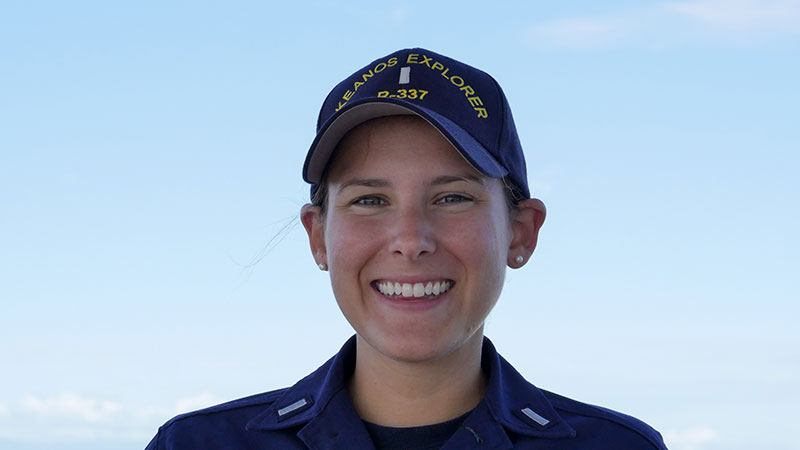
Image courtesy of the NOAA Office of Ocean Exploration and Research, Exploring Deep-sea Habitats off Puerto Rico and the U.S. Virgin Islands. Download image (jpg, 2.0 MB).
I have sailed as far west as Samoa and also brought the ship through the Panama Canal en route to the U.S. East Coast. Currently, we are circumnavigating Puerto Rico.
My favorite part of the day is standing eight hours of bridge watch. I control the ship’s movements, maintain the logs, plot our position on the paper charts, keep an eye out for traffic or other hazards, bring the ship on station, put it in dynamic positioning mode, and help the crew with deployment and recovery of the remotely operated vehicles Seirios and Deep Discoverer.
In 2019, I will transition to a support role and serve as the Operations Officer for the Pacific Islands Marine Operations Center.
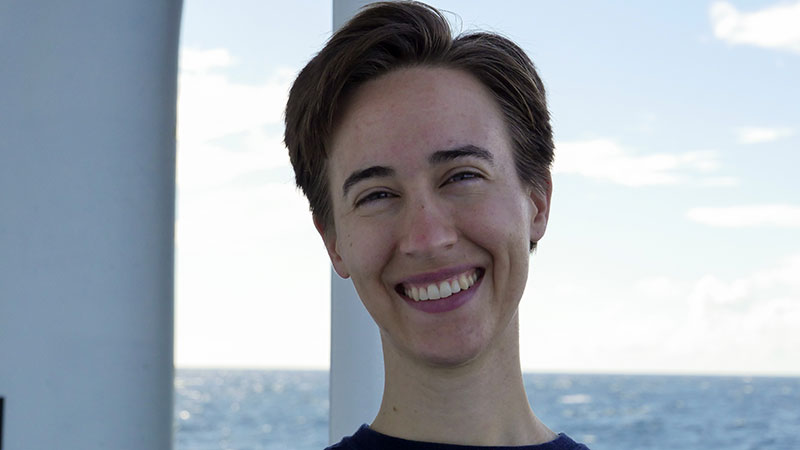
Image courtesy of the NOAA Office of Ocean Exploration and Research, Exploring Deep-sea Habitats off Puerto Rico and the U.S. Virgin Islands. Download image (jpg, 4.4 MB).
I reported for duty on NOAA Ship Okeanos Explorer in June 2017 and am the ship’s Safety Officer, Morale Officer, and Property Officer. I am also a member of the SCUBA Dive Team and a qualified Officer of the Deck.
Read Anna's Story
I reported for duty on NOAA Ship Okeanos Explorer in June 2017 and am the ship’s Safety Officer, Morale Officer, and Property Officer. I am also a member of the SCUBA Dive Team and a qualified Officer of the Deck. My typical day at sea consists of two, four-hour blocks standing watch on the bridge, a few hours working on my other duties, a workout, two or three hot meals provided by our stewards, and as much sleep as I can fit in before getting up and doing it all over again. At this pace, I’m never bored, and a three-week cruise is over before I know it!
Before joining NOAA Corps, I had no maritime experience beyond a smattering of day trips on small research vessels. It has definitely been a steep learning curve. However, that is part of what drew me toward NOAA Corps; it is a career that will keep me constantly gaining new skills and experiences, developing a sense of discipline and teamwork, and not least of all, contributing in a tangible way to NOAA’s scientific mission. It is the biggest challenge I have ever tackled, and my abilities are stretched and tested every day. But with my amazing shipmates and support network of fellow officers, it is an environment that promotes growth and excellence. I am proud to be a NOAA Corps Officer.
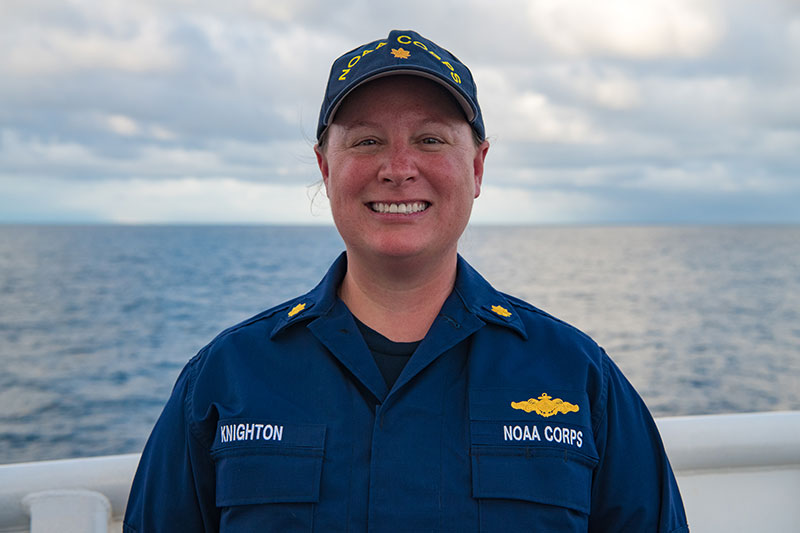
Image courtesy of the NOAA Office of Ocean Exploration and Research, Exploring Deep-sea Habitats off Puerto Rico and the U.S. Virgin Islands. Download image (jpg, 3.3 MB).
I will be joining the wardroom of NOAA Ship Okeanos Explorer in the spring of 2019 as the Executive Officer. Currently, I am sailing on the Océano Profundo 2018 expedition as pass-down training of duties and learning the remotely operated vehicle operations.
Read Faith's Story
I will be joining the wardroom of NOAA Ship Okeanos Explorer in the spring of 2019 as the Executive Officer. Currently, I am sailing on the Océano Profundo 2018 expedition as pass-down training of duties and learning the remotely operated vehicle operations.
I studied Fisheries Biology at Florida State University (BS, 2001) and conducted research in Florida studying sharks, sea turtles, protected species, and critical habitats. In 2007, I joined NOAA Corps out of wanderlust and a desire to be a part of broader scientific research.
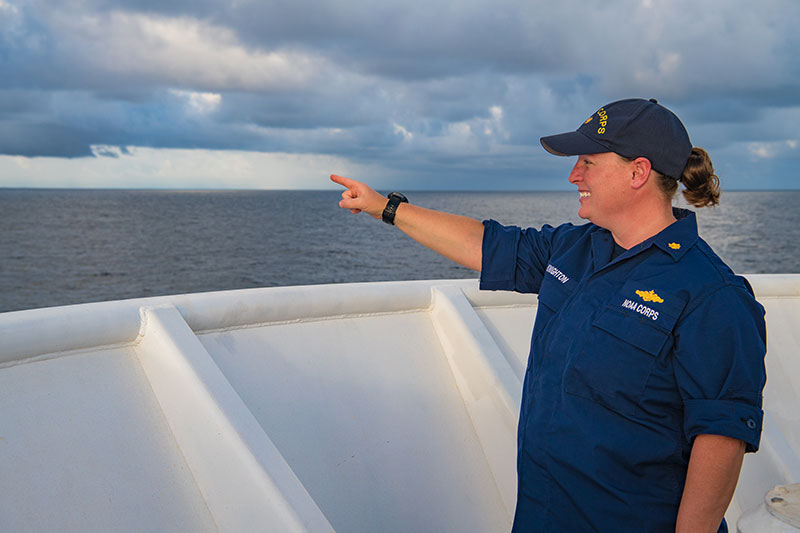
Image courtesy of the NOAA Office of Ocean Exploration and Research, Exploring Deep-sea Habitats off Puerto Rico and the U.S. Virgin Islands. Download image (jpg, 3.1 MB).
My first sea tour (2007-2010), took me to the Arctic ice shelf and the Bering Sea as a Junior Officer aboard NOAA Ship Oscar Dyson, a ship instrumental in population studies of the largest commercial fisheries of the United States and also for studying marine mammals and deploying oceanographic instruments. In 2010, I reported as a Staff Scientist at the Pacific Islands Fisheries Science Center in Hawaii, where I was tasked with coral reef research, SCUBA diving, small boat operations, and habitat mapping. During this billet, I completed graduate studies in Ocean Policy and Geography at the University of Hawaii (MA, 2013). In 2014, I took on the Operations Officer role aboard NOAA Ship Hi’ialakai, liaising between the ship and coral reef researchers, which collectively conduct up to 8,000 SCUBA dives per a year in the remote Pacific Islands from Hawaii to the South Pacific. Since 2016, I have been the Executive Officer at the NOAA Diving Center, supporting 400 divers throughout all NOAA missions and Line Offices in their research missions and training needs, overseeing budget and personnel, and serving as a Unit Diving Supervisor and member of the Diving Safety Board. My work allows me to combine my love of travel with SCUBA diving.
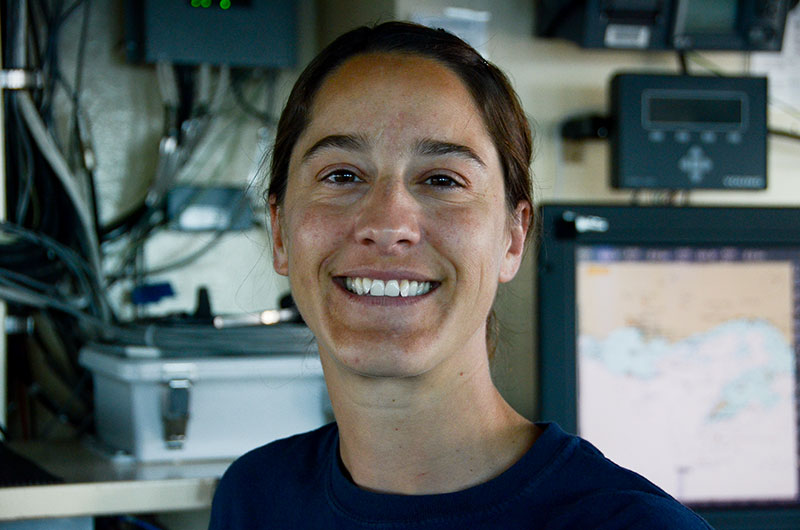
Image courtesy of the NOAA Office of Ocean Exploration and Research, Exploring Deep-sea Habitats off Puerto Rico and the U.S. Virgin Islands. Download image (jpg, 4.3 MB).
I have the coolest job in the world! I get paid to travel, drive NOAA ships, and advance my leadership skills. But, how did I get here and what makes my job so cool?
Read Rosemary's Story
I have the coolest job in the world! I get paid to travel, drive NOAA ships, and advance my leadership skills. But, how did I get here and what makes my job so cool? I’ve always felt that I was born to be in, on, or under the water, and I also desired to serve the country. The NOAA Corps allows me to serve in a special way being that it’s the perfect blend of science and service. For the last seven years, I’ve been able to see some amazing places, work with stellar groups of people, take part in personal development training, and participate as a supporting marine scientist in various roles.
I started my NOAA career aboard one of our hydrographic research vessels, NOAA Ship Rainier, where I primarily traversed Alaskan waters and was directly involved in the updating of nautical charts. I earned a Global Maritime Distress and Safety System Equipment Operator license, became a NOAA Working Diver, and participated in training such as Fast Rescue Boat and Dynamic Positioning Operation.
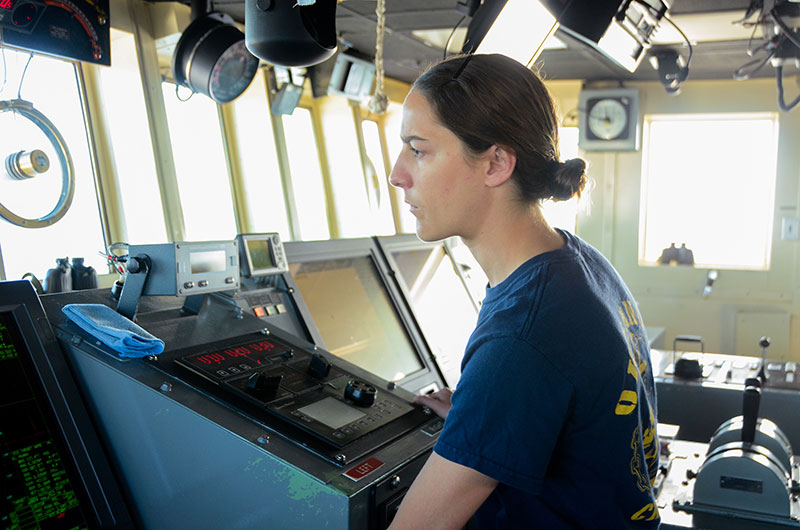
Image courtesy of the NOAA Office of Ocean Exploration and Research, Exploring Deep-sea Habitats off Puerto Rico and the U.S. Virgin Islands. Download image (jpg, 3.2 MB).
Following that assignment, I moved across the country from Oregon to Key West, where I supported the science, education, and outreach teams at the Florida Keys National Marine Sanctuary. During that time, I had the opportunity to assist a large-scale coral reef restoration project, conduct numerous seagrass and coral damage assessments from boat groundings, and support monitoring of coral bleaching events. Now assigned aboard NOAA Ship Okeanos Explorer, I am continuing to learn about hydrography and I get to participate in an important and exhilarating mission: ocean exploration.
Aside from being responsible for mission accomplishment and the safe navigation of the vessel, I am the Operations Officer aboard NOAA Ship Okeanos Explorer. My duties include serving as the principal liaison between the Command and the scientific personnel for each project, as well as managing daily operations. I coordinate and lead project meetings, prepare the ship's plan of the day, and manage the shipboard daily activity tracker to provide daily ship activity metrics to the Marine Operations Center. Additionally, I serve as the first-level back up to the Executive Officer, assisting with duties such as coordination of port logistics. At times, it can be a demanding role, but the rewards far outweigh the challenges. I feel fortunate to be a part of such an important mission and solid team!
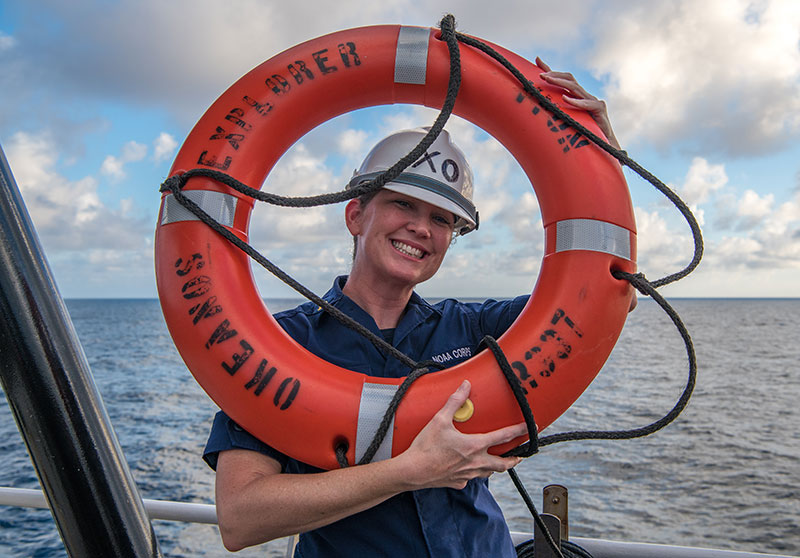
Image courtesy of the NOAA Office of Ocean Exploration and Research, Exploring Deep-sea Habitats off Puerto Rico and the U.S. Virgin Islands. Download image (jpg, 3.6 MB).
I’m the Executive Officer on NOAA Ship Okeanos Explorer. I joined the NOAA Corps about 15 years ago. When I applied, I had a B.S. in Biology and a respectable job in State Government. After five years there, I was antsy to get out of the office and onto the water.
Read Fionna's Story
I’m the Executive Officer on NOAA Ship Okeanos Explorer. I joined the NOAA Corps about 15 years ago. When I applied, I had a B.S. in Biology and a respectable job in State Government. After five years there, I was antsy to get out of the office and onto the water. The NOAA Corps offered travel, adventure, and the chance to work toward a healthier planet. I knew it would also push me to grow.
As the Executive Officer, I spend most of my time doing office work at sea, managing people, time, and money. I try not to think about the irony too much. The perks are unique and the view is always changing. I finished graduate school just before I joined the ship. I was working full time, so it was intense, but the GI Bill reduced the cost. Now I have a Master of Arts degree in film, TV, and video production and a lot of stories to tell.
I’ve spent over six years at sea, and that’s less than some of my peers, because I had a few extended land tours. On land, there’s nearly always the option to walk away from your work, but on the ship, you can only go as far as 220 feet. It’s counterintuitive, because the idea of going to sea sounds so adventurous, so romantic and bold. What actually happens is that your world collapses into a rather small bubble. It’s you, your shipmates, and the ship itself – all at each other’s mercy. It can be soul-squashing or a lot of fun, depending on the company. The crew functions as a family. We all keep a sense of humor and help each other out.
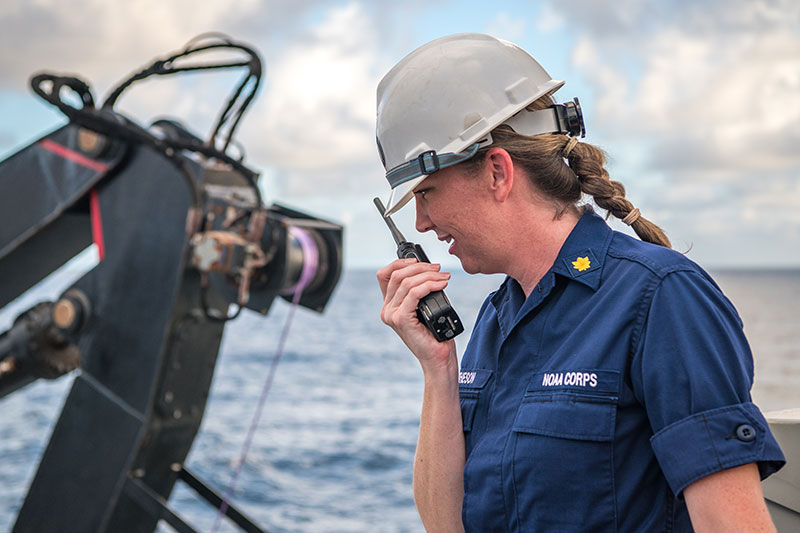
Image courtesy of the NOAA Office of Ocean Exploration and Research, Exploring Deep-sea Habitats off Puerto Rico and the U.S. Virgin Islands. Download image (jpg, 3.0 MB).
This itinerant lifestyle isn’t for everyone. This is not the kind of job you can slip off at the end of the day. It demands that we choose work over everything else for months and years at a time. Officers have to be versatile, efficient, extremely patient, and willing to pick up and relocate every couple of years. We have to be effective alone and in teams. We have to be good at a wide variety of things, including working with people, numbers, teaching, driving ships, spatial relations, and fixing stuff on the fly. While this is a lot to ask, it’s also a huge opportunity to grow and stretch yourself in unpredictable ways. For instance, I’m pretty good at landing remote control helicopters now. Driving the ship with a joystick during remotely operated vehicle operations has given me a light touch. The upside to all the hard work and privation is that our good days are extraordinary.
Because I chose this career, I’ve fished Georges Bank in the winter, transited through the Panama Canal, crossed the Equator at the International Dateline, hovered 5,000 meters above the seafloor in the sapphire waters of the Pacific, met a Svalbard reindeer in the Norwegian Arctic, seen a surprisingly swift baby whale shark in its natural habitat, and explored the wreck of the Nantucket whaling ship Two Brothers just moments after it was discovered. I would have had a very different life without the NOAA Corps, and I doubt it would have been as interesting. I’ve worked with people who became my heroes and my friends, and I still do.
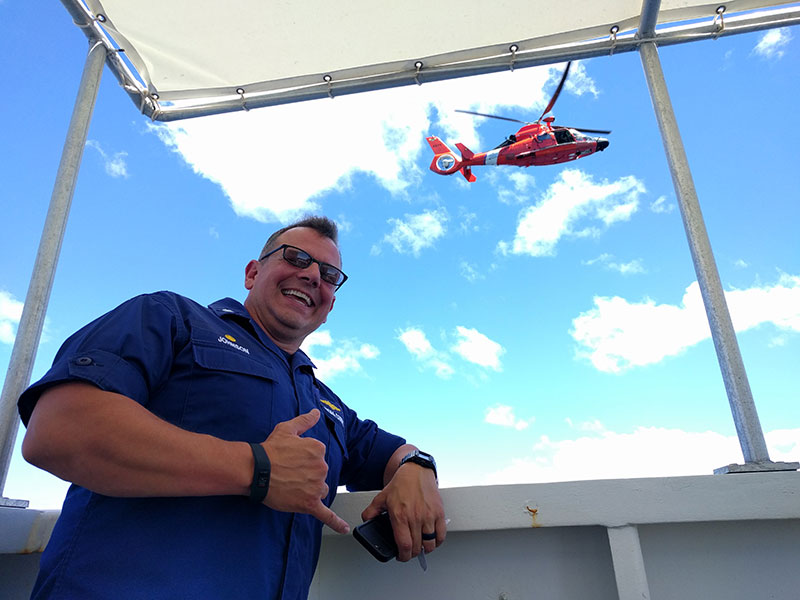
Image courtesy of the NOAA Office of Ocean Exploration and Research, Exploring Deep-sea Habitats off Puerto Rico and the U.S. Virgin Islands. Download image (jpg, 3.3 MB).
I’ve loved the water and wanted to work with the natural world all my life. Finding the NOAA Corps by accident was one of the most fortuitous events that helped get me where I am today.
Read Eric's Story
I’ve loved the water and wanted to work with the natural world all my life. Finding the NOAA Corps by accident was one of the most fortuitous events that helped get me where I am today. I had some challenges in college; I was not the most applied student when I started. Then I took a break, but went back and completed my degree in marine biology. I’ve had many jobs, but I know I’ve learned different skills from all of them.
I started with the NOAA Corps as an Ensign and after Basic Training, started my first sea tour on NOAA Ship Oregon II doing fisheries research. Following my experience there, I went on to my first land assignment, where I was the Executive Officer for the NOAA Dive Program, training divers in the water and the classroom. I then went back to sea on NOAA Ship Hi‘ialakai as the Operations Officer, acting as the liaison between the scientific party and the ship, which collectively conducts upwards of 4,000 research SCUBA dives per year. After a year as the Operations Officer, I fleeted up to become the Executive Officer for the rest of my time there.
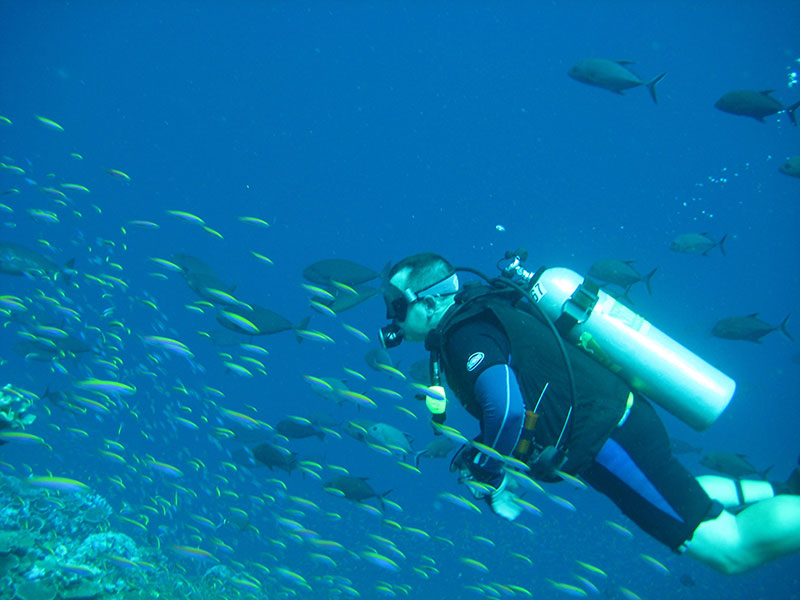
Image courtesy of the NOAA Office of Ocean Exploration and Research, Exploring Deep-sea Habitats off Puerto Rico and the U.S. Virgin Islands. Download image (jpg, 2.2 MB).
Following my time in Hawai’i and the Pacific, I reported to Silver Spring, Maryland, as the NOAA Corps recruiting officer, one of the most important jobs in the Corps, bringing in the new generations of officers. My next assignment brought me back to the Oregon II, this time as the Executive Officer. After that sea-tour, I reported to the Integrated Ocean Observation System (IOOS) for my next assignment, working in Silver Spring. I was then selected for Command here on NOAA Ship Okeanos Explorer and took over the ship in July of 2017.
Working on NOAA Ship Okeanos Explorer is a very rewarding experience. Running this ship is a total team effort that makes me proud to be a part of. The crew work very hard behind the scenes to make the operations successful. From the engineers tweaking, repairing, and maintaining all the ship systems; stewards making excellent meals for up to 50 people three times a day; deckhands who run all the equipment for deployment, drive the small boats, preserve and maintain the material condition of the ship; to the officers and mates driving the ship, ordering supplies, running morale for all, and coordinating and keeping all personnel safe in a very challenging environment. And our mission to explore and discover new species, habitats, geological histories, and archaeological finds makes a real difference in our understanding of the world and helps us make it a better place for future generations, especially important to me now as my wife and I are expecting a new little girl! Through the work we do here, the nation and world see things they would otherwise not be able to in the regular course of their lives.